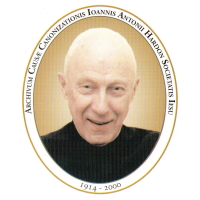St. John the Baptist
by Fr. John A. Hardon, S.J.
The one person whom the Liturgy most features during the season of Advent is John the Baptist. He was described by the Savior as the greatest person ever born of woman. We may be sure the Savior excluded himself, who is a Divine Person, and His Mother Mary. But John the Baptist was by all accounts the principal figure after Christ Himself in the Gospels until the Church was founded. He is the last of the prophets of the Old Testament and the first of the prophets of the New. There are three features about John the Baptist that I believe the Church especially wants us to recognize and, as far as we can, imitate: John’s faith, humility and fearless courage.
John was a man of deep faith. We know, of course, we don’t begin to exercise our faith—make acts of faith—until we’ve reached the age of reason. But we have the faith—we are Christians—from the moment we are baptized. John was not baptized with the Sacrament of Baptism. But John did receive sanctifying grace even before he was born. The moment Mary came close to John’s mother, John not yet born recognized the Messiah and leaped for joy—the joy of the faith that recognized that Jesus whom Elizabeth correctly identified as her Lord. John’s faith all through life was the first virtue that we are to both admire and imitate. But let’s be clear about how much of John’s faith is imitable. It is mainly, but not only, that John recognized who Christ was; John also recognized who man is. John recognized man as a sinner who needs a redeemer. That’s why, when he identified the Savior and pointed Him out as the Lamb of God who takes away the sins of the world, there are really two articles of faith combined in that title. They are faith in Christ as the Incarnate Son of God who redeems, and faith in man’s being a sinner who needs redemption. I dare say in imitating John we need to learn both—both who Christ is (the Son of God in human form) and who we are (sinners, desperately in need of redemption).
Secondly, John the Baptist was not only a man of deep faith, he was a man of profound humility. Everything about him reflects this. Remember how he spoke about the Master: “I baptize you with water, but one greater than I will come after me, the latchet of whose shoes I am not worthy to loosen.” He begged the Savior, “You should baptize me, not I you.” And—a phrase I recommend we memorize—“He must increase and I must decrease.” What a formula for humility—that we make sure no one is glorified by what we do except the Christ for whom we labor.
Finally, John the Baptist was a man of fearless courage. My friends, it takes a lot of courage to tell the truth. John told the truth. I believe the single greatest need in the Church today is for people in the Church, especially those who have authority and positions of leadership, to tell the truth and live the truth. John spoke the truth. John lived the truth. That is why he died a martyr’s death.
John, the Lord’s precursor, is featured as such in the Advent Liturgy because his responsibility was to prepare people to receive Christ. All of us, in greater or lesser measure, are to help people find Jesus. John should be our model—deep faith, profound humility and fearless courage.
John the Baptist, forerunner of the Savior, help us to prepare our own souls and the hearts of others for that Christmas Day for which we were all born. My definition of heaven: when the God who became man in Bethlehem will embrace us with his human arms and tell us—and for all eternity it will be true—you belong to Me.

